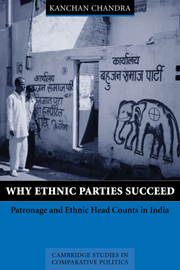Book contents
- Frontmatter
- Dedication
- Contents
- List of Maps, Figures, and Tables
- List of Abbreviations
- A Note on Terminology
- Acknowledgments
- 1 Introduction
- Part I Theory
- Part II Data
- Appendix A Elite Interviews
- Appendix B Ethnographies of Election Campaigns
- Appendix C Content Analysis
- Appendix D Description of Survey Data
- Appendix E Description of the Ecological Inference (EI) Method
- Appendix F Method Used to Estimate Ethnic Voting Patterns
- Bibliography
- Index
- Miscellaneous Endmatter
1 - Introduction
Published online by Cambridge University Press: 19 October 2017
- Frontmatter
- Dedication
- Contents
- List of Maps, Figures, and Tables
- List of Abbreviations
- A Note on Terminology
- Acknowledgments
- 1 Introduction
- Part I Theory
- Part II Data
- Appendix A Elite Interviews
- Appendix B Ethnographies of Election Campaigns
- Appendix C Content Analysis
- Appendix D Description of Survey Data
- Appendix E Description of the Ecological Inference (EI) Method
- Appendix F Method Used to Estimate Ethnic Voting Patterns
- Bibliography
- Index
- Miscellaneous Endmatter
Summary
Why do ethnic parties succeed in obtaining the support of members of their target ethnic group(s)? ethnic political parties now flourish across the democratic world. canada, spain, india, the united kingdom, israel, sri lanka, macedonia, south africa, and russia are only a few examples of the established or emerging democracies in which they have taken root. for social scientists interested in explaining important political phenomena, the question is worth asking for its own sake. at the same time, the answer has broader implications for those with a stake in the survival of democratic regimes. ethnic parties, and the politicization of ethnic differences more generally, are presumed to constitute a major threat to democratic stability.1 an exploration of the processes by which such parties succeed or fail, then, illuminates also the processes that undermine or preserve democracy.
Drawing on a study of variation in the performance of ethnic parties in India, this book proposes a theory of ethnic party performance in one distinct family of democracies, identified here as “patronage-democracies.” Voters in patronage-democracies, I argue, choose between parties by conducting ethnic head counts rather than by comparing policy platforms or ideological positions. They formulate preferences across parties by counting the heads of co-ethnics across party personnel, preferring that party that provides greatest representation to their co-ethnics. They formulate expectations about the likely electoral outcome by counting the heads of co-ethnics across the electorate. And they vote for their preferred party only when their co-ethnics are sufficiently numerous to take it to a winning or influential position.
This process of ethnic head counting is the foundation for the central argument advanced in this book: An ethnic party is likely to succeed in a patronage-democracy when it has competitive rules for intraparty advancementandwhen the size of the ethnic group(s) it seeks to mobilize exceeds the threshold of winning or leverage imposed by the electoral system. Competitive rules for intraparty advancement, other things equal, give a party a comparative advantage in the representation of elites from its target ethnic category. And a positive difference between the size of its target ethnic category and the threshold of winning or leverage indicates that the party has a viable shot at victory or influence.
- Type
- Chapter
- Information
- Why Ethnic Parties SucceedPatronage and Ethnic Head Counts in India, pp. 1 - 30Publisher: Cambridge University PressPrint publication year: 2004



